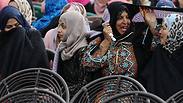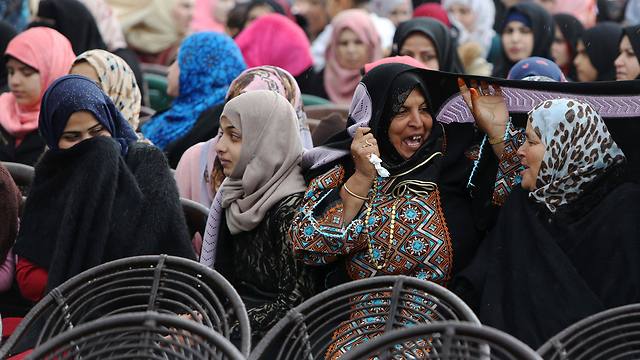
Breaking the glass ceiling: Gaza women open their own businesses
'Women need to become economically independent,' says successful Palestinian businesswoman Maram Ganem, who owns Gaza's first fast-food place and a large upscale restaurant in Gaza City.
In the traditionally conservative Palestinian society of the densely populated Gaza Strip, women do not have many opportunities for entrepreneurship. Women usually marry young and raise large families. Yet a small number of women in Gaza are opening their own businesses and serving as a model to young women throughout Gaza.
Maram Ganem began working at age 32 as an employee at a restaurant in Gaza. Five years later, she decided to start her own business. Today she owns two restaurants in Gaza – a fast food place, and a large fancy restaurant overlooking the Mediterranean Sea.
Speaking to The Media Line, she said that the first part of her dream came true when she rented a small space in a hotel in Gaza City in partnership with a local businessman. Shortly after that she opened the first-ever fast-food restaurant in Gaza. The success of her projects led to the opening of the Roots restaurant, one of the most upscale restaurants in the city.
Ganem believes that determination and strong personality were the main reasons behind her success. She even represented the Palestinians at economic conferences in Egypt.
"If you have the will, you can do anything,” she told The Media Line. “I have met my goals despite the difficult political and economic conditions we face."
She also credits her husband with contributing to her business success.
“You need family support to survive in Gaza,” she said. “Men usually control most of the businesses here, and women are the workers or employees.”
Ganem was in Ramallah to attend the National Investment Conference, hosted by the Palestinian Ministry of Economy and Ministry of Tourism, which aims to increase international tourism to the West Bank and Gaza Strip. Representatives from more than 120 companies owned by Palestinians who live abroad came to the West Bank to discuss possible investment.
While unemployment in the West Bank has decreased slightly to just over 18 percent, in Gaza it is almost 40 percent. Unemployment is especially high among young Palestinians, including university graduates.
To attend the conference, Ganam had to receive a permit from Israel to travel from Gaza to Ramallah via Israel. She said she hoped to encourage tourism to Gaza despite widespread destruction that still exists from last summer’s fighting between Hamas and Israel that left more than 2200 Palestinians and 70 Israelis dead. She said she also hoped to find female partners to buy and run a hotel in Gaza.
“Women need to become economically independent,” she said. “We need to see more women in business in Gaza, to enable them to play a bigger role in the Palestinian community.”
Another woman at the investment conference was Fatima Reyes, who seemed to be perpetually smiling. To become a successful businesswoman one must have ambition, along with support from friends and family, she said.
"We helped her by all means and always supported her ideas,” Samer Reyes, her brother and business partner told The Media Line. “She had a goal, and she has achieved it. Seriously I'm very proud of my sister," he said.
She opened a local services company, where she is the manager and Samer is the accountant. They offer services from gardening to cleaning to marketing to filling out visa applications.
“Women still face a lot of social taboos,” she told The Media Line. “I need my brother at the market to make deals with men. We work as partners.”
“If I didn’t have this business both my brother and I would be unemployed,” she said. “We did not have any job opportunities since we graduated, so we decided to start our own business.”
Women can get some help from the Gaza Women’s Loan Fund of ANERA, a relief organization, which provides seed money to low income women.
Fathia Abu Amer lives in the Gaza neighborhood of Saja'iyya. In her fifties, she runs a successful business from her home, selling colorful dresses for young girls to wear in wedding celebrations. She stores her clothes in a small warehouse with rows of white, red, and purple dresses neatly arranged on one side and quilts, baby blankets and table cloths along the other wall.
Fathia said she started to realize her life-long ambition when she took her first loan in 1995.
Fathia travels regularly to Egypt to buy clothes and sell them in Gaza and has become a sales representative for a long list of traders in Egypt and Gaza.
“Before taking my first loan, I was a tailor and had three sewing machines,” she told The Media Line. “But I wasn’t able to grow or expand because I lacked cash to pay for the cloth and other materials.”
At the time, Fathia lived in a small rented apartment and had problems paying the high prices to get the materials and still make ends meet.
“When I heard about the loans, I immediately went to get one. I could pay the traders in cash and they gave me better prices. That meant I was able to pay for my rent and food for my family, buy the materials, make a reasonable profit and, above all, repay my loan on time.”
By that time, she realized how powerful she could be and how much she could accomplish with the help of that loan. Twenty years later, Fathia has bought a house and hopes to build an extra room to accommodate more goods to sell. Just recently, she said, a woman bought 10 dresses for a wedding party.
Over the past 20 years, Fathia has taken seven loans from the Gaza Women’s Loan Fund, ranging from $3500 to $5000, and always pays them back on time. Her husband Ahmad helps with marketing the goods and often lends a hand to glue beads on the dresses to add a bit more glamor for special occasions.
“We get a lot of items depending on the season — wedding dresses for summer, wool clothing for kids in winter.”
Fathia said she is proud of what she has accomplished for herself and her family. “I sent two kids to university and I feed my family.”
Article written by Fatema Mohamed
Reprinted with permission from The Media Line











